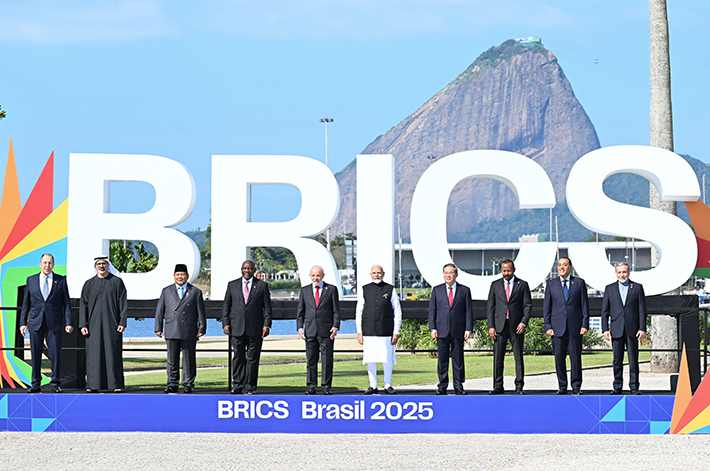|
||||||||||
| Home Top News Economy/Tech Culture/Sports China in Foreign Eyes Green Development Videos Intangible Cultural Heritages |
|
||||||||||
| Home Top News Economy/Tech Culture/Sports China in Foreign Eyes Green Development Videos Intangible Cultural Heritages |
| ChinAfrica |
| Building, Brick by Brick |
| BRICS cooperation mechanism grows stronger amid rising global uncertainties |
| By Ma Miaomiao, Reporter, Beijing Review | VOL. 17 August 2025 ·2025-07-24 |

Leaders attending the plenary session of Peace and Security and Reform of Global Governance of the 17th BRICS Summit pose for a group photo in Rio de Janeiro, Brazil, on 6 July (XINHUA)
Against a backdrop of escalating geopolitical tensions, economic fragmentation and climate crises, the two-day 17th BRICS Summit concluded in Rio de Janeiro, Brazil, on 7 July, with a resounding commitment to deepen collaboration among member states and expand the group’s influence in shaping a more equitable global order.
BRICS is the acronym for an emerging-market cooperative mechanism that initially comprised Brazil, Russia, India, China and South Africa. With more countries joining BRICS, the group’s representativeness and influence have steadily grown, forging a stabilising force in a changing and turbulent world.
This was the very first leaders’ meeting following the group’s latest rounds of expansion, adding the new member Indonesia in January and new partner countries in January and June.
Themed Strengthening Global South Cooperation for a More Inclusive and Sustainable Governance, the summit adopted a joint declaration covering 126 commitments across global governance, finance, climate, health and technology. It outlined new efforts to combat hunger, advance climate action and expand access to emerging technologies.
“The summit convened amid a complex global landscape, with the United States applying considerable pressure on the group,” Xu Feibiao, director of the China Institutes of Contemporary International Relations’ Centre for BRICS and G20 (Group of 20) Studies, told Beijing Review. Against this backdrop, the successful gathering, which expanded participation to more developing countries, carries substantial weight, bridging past accomplishments with future progress.
When addressing the plenary session of Peace and Security and Reform of Global Governance of the summit on 6 July, Chinese Premier Li Qiang said the current international economic and trade order, along with the multilateral trading system, is facing severe challenges, and the global economic recovery remains arduous.
Greater BRICS cooperation should uphold and practice multilateralism, promote the establishment of a fair and open international economic and trade order, pool the strength of the Global South, and make greater contributions to global stability and development, he added.
On-the-ground impact
The summit adopted a more simplified, efficient and practical approach, focusing on six priority areas, including climate change, AI governance and global public health governance, to deliver tangible results, Xu said, adding that it reaffirmed the BRICS spirit, principles and objectives, solidifying the foundation for future cooperation and ensuring cohesion in a larger framework.
The charm of BRICS primarily stems from the results achieved over its 19 years of cooperation. On the one hand, the BRICS mechanism has brought benefits to each member, helping them to enhance their international and regional influence while creating substantial opportunities for their development, Wang Lei, director of the Centre for BRICS Cooperation Studies at Beijing Normal University, told newspaper People’s Daily.
On the other hand, he added, BRICS upholds multilateralism, ensuring that all member states, big and small, participate equally in decision-making and reach consensus through consultation.
Today’s BRICS family represents over half of the world’s population and contributes 40 percent of global economic output - measured at purchasing power parity, an analysis metric comparing currencies based on the cost of goods in different countries, according to Reuters. Data from the International Monetary Fund showed the collective GDP growth rate of BRICS countries reached 4 percent in 2024, higher than the global average of 3.3 percent.
BRICS emphasises the need to fully represent the interests of emerging markets and developing nations and to promote reforms in the current international system - both of which are also crucial for all Global South countries, Wang said.
For better governance
“In the face of the resurgence of protectionism, it is up to emerging nations to defend the multilateral trading regime and reform the international financial architecture,” Brazilian President Luiz Inácio Lula da Silva said in his address to the BRICS Business Forum on 5 July.
In its joint declaration, BRICS member countries advocated for peace in response to global conflicts and wars. They also voiced serious concerns about the rise of unilateral tariffs and non-tariff measures which distort trade and are inconsistent with World Trade Organisation rules, without directly mentioning the US. “The proliferation of trade-restrictive actions threatens to further reduce global trade, disrupt global supply chains, and introduce uncertainty into international economic and trade activities,” the declaration read.
The summit maintained a low-key and moderate stance on sensitive issues, emphasising BRICS as a development-focused platform rather than a confrontational partnership targeting any third party, in stark contrast to some antagonistic Western-dominated cliques, Xu said.
“BRICS is increasingly shaping global debates on development, multipolar governance and security matters,” South African President Cyril Ramaphosa said during the summit, adding, “With our broad geographical footprint and growing influence, BRICS is uniquely positioned to advocate for reform in global governance structures.”
“The demand for new global governance is not a whim, but a process of historical reparation. The BRICS offers a platform for inclusive cooperation, removed from hegemony and closer to the principles of multipolarity,” Jhonathan Mattos, an associate professor with the Department of International Relations at Rio de Janeiro State University, told Xinhua News Agency.
The BRICS stands for “a model of multilateralism, multipolarity, regional integration and the identity of shared demands,” Mattos added.
| About Us | Contact Us | Advertise with Us | Subscribe |
| Copyright Beijing Review All rights reserved 京ICP备08005356号-5 京公网安备110102005860号 |